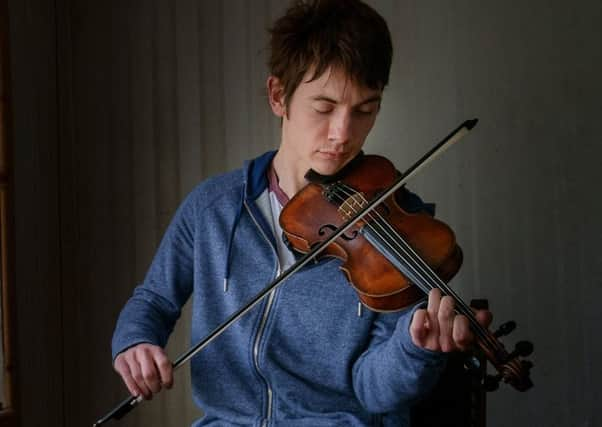Ones to watch in 2017 - fiddler Ryan Young


The tune’s the thing, so far as Ryan Young is concerned. The 26-year-old fiddler from Cardross, Dunbartonshire, was voted Up and Coming Artist of the Year at the Scots Trad Music Awards at the beginning of this month and will further consolidate his reputation in the new year, when January sees him share a Celtic Connections bill with his hero, the renowned Clare fiddle master Martin Hayes, and March brings the release of his debut album, produced by the Grammy-award-winning Jesse Lewis.
“I was completely stunned when I won,” says Young of his award at “Na Trads”. “The awards highlight how fantastic traditional music is,” he adds. “And it really is all about the music. At the heart of everything I do is the melody.”
Advertisement
Hide AdAdvertisement
Hide AdHe’s speaking to me from his home in Cardross, having just returned from playing in Skye with the Young Trad Tour which features winners and finalists from BBC Radio Scotland’s Young Traditional Musician awards. One of his fellow musicians on the tour was Gaelic singer Ainsley Hamill, also from his neighbourhood, which also produced fiddler Eilidh Steel, who gave him his first proper fiddle lessons.
Young doesn’t come from a musical family. His epiphany came, he says, when he was about ten and saw Shetland fiddle maestro Aly Bain playing on television’s Hogmanay Show. “I’d never heard that sort of thing before and it just inspired me.”
“That sort of thing” has consumed his life since. “I’d had violin lessons at school but only 15 minutes a week. I started going to a fiddle group that Eilidh took, but didn’t have my own teacher until I went to the Royal Conservatoire of Scotland.”
He entered the RCS as a junior student, and a series of scholarships saw him continue as an undergraduate, studying under the likes of Pete Clark, Alistair McCulloch and Marie Fielding, graduating with a BA (Hons) first class and scooping the Arthur Robertson Prize for Scots fiddle music, before completing a master’s earlier this year. While soaking in Scots fiddle music at the conservatoire, however, his extra-curricular listening was homing in on some of the great Irish fiddlers, not least East Clare’s Martin Hayes.
He has been a finalist in BBC’s Radio 2 Young Folk Awards and in the Radio Scotland Young Traditional Musician of the Year competition. Listening to him playing a strathspey during the latter event, one was conscious of the Scots tune being nursed with the kind of plangent, unhurried dip and swoop we’ve come to associate with Hayes. “My Masters was actually about that,” he explains. “I did recitals in Ireland and Scotland and interviewed audience members – sometimes including famous musicians. What came back was that in Scotland they thought I sounded very Irish and in Ireland they thought I sounded very, very Scottish …”
The initiative of enlisting Lewis, a Grammy-winning, Boston-based producer who has worked with the likes of Béla Fleck and Yo Yo Ma’s Silk Road Ensemble, was not his. A couple of enthusiastic fans sent a recording of Young to Lewis, who promptly e-mailed him and said he’d like to work with him. He then flew to Scotland and found Young recording in an RCS recital room, with James Ross on piano and Leo Forde on guitar. “Jesse kind of knew what I wanted to do without me having to say it to him.”
Apart from a couple of his own compositions, the album draws on some of the old Scottish collections which he feels tend to be overlooked in the current efflorescence of tune writing. In the meantime he is looking forward to opening for Martin Hayes and uilleann piper David Power during Celtic Connections. Young has met Hayes before but has never played with him, so hopes to share some tunes with him on the night.
Advertisement
Hide AdAdvertisement
Hide AdHe has, however, played on stage with Hayes’s regular collaborator, Chicago-Irish guitarist Dennis Cahill, at Feakle music festival in Clare. “It was a bit surreal, hearing someone you’ve been listening to through headphones for the past ten years, but the guy’s sitting playing next to you.
“I’m really just interested in the tune and playing it the best it can be,” he says, citing another Irish fiddle hero of his, the widely revered Tommy Potts, who died in 1988. Young had admired his distinctive style for a long time before he discovered from Hayes that Potts was also a hero of his. “Tommy Potts would just play the one tune and take it to so many different places. That’s what I’d like to do – get more away from the whole tune sets thing and just focus on one tune.”
He believes that what he does to enhance a tune transcends either Scots or Irish stylistic emphasis. “Whether the playing style is classified as Scottish, Irish or Cape Breton doesn’t really matter; it’s where the tune comes from. It will always be a Scottish tune at the end of the day.”
Martin Hayes & David Power, with Ryan Young, play Glasgow Royal Concert Hall’s Strathclyde Suite on 23 January, as part of Celtic Connections. See www.celticconnections.com and www.ryanyoung.scot